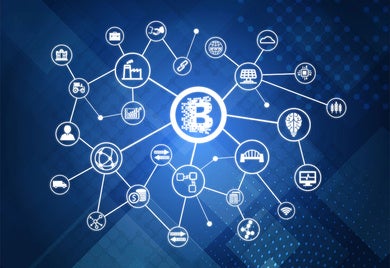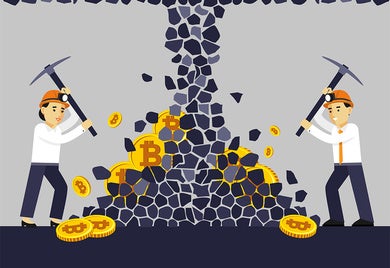
Four Benefits Brought by Using the Blockchain in Capital Markets
The blockchain brings great benefits for capital markets, as it allows to share a complete and immutable dataset of information creating a more transparent, cheaper, more liquid and easier to monitor market-place for participants to transact and price securities.

Blockchain: Democratizing finance
Fourteen million small agricultural producers in Latin America and the Caribbean are exposed to climate change with repercussions on land quality and yield. These producers have very limited ability to access financial services such as agricultural insurance. Less than 20% of local banks serve agribusiness, due to the high costs and the difficulty of assessing credit risk or damages in the case of insurance. The revolution in financial inclusion has the shape of blocks This situation is changing through the introduction of Blockchain in financial services. Blockchain is a technology to carry out financial transactions securely, transparently, and reliably between two separate users, whether banks or individuals, without using an intermediary, so that costs can be reduced. Blockchain technology uses a distributed database that saves blocks of information and links them to facilitate information retrieval and verify that the blocks have not been altered. In the case of agricultural insurance, Blockchain makes possible the use of smart contracts between the farmer and a financial institution, using reliable information based on weather data. One of the advantages is the automatic execution of the contract that relies on predefined conditions without requiring human interpretation. For example, a compensation is paid when a defined quantity of rain is exceeded, causing production losses. Another advantage is that with this model, insurance can be accessible in terms of costs ($2 to $3 per month) and in terms of geographic coverage, which is not feasible with the traditional insurance model. [clickToTweet tweet="Some banks stated that Blockchain-based commercial services will operate before the end of 2017" quote="Some banks stated that Blockchain-based commercial services will operate before the end of 2017." theme="style1"] There are already start-ups developing products that increase financial inclusion using Blockchain technology, such as the Etherisc company with crop insurance. Other applications cover remittances’ transfers, identity and background check systems, clearing and settlement in payment systems, credit history, property registration, and land tenure. The rules of the game are changing for financial institutions With the availability of Blockchain, banks can increase their client base, geographic coverage, and the financial products they offer while reducing operating costs. In an IBM survey, 17% of the banks interviewed stated that Blockchain-based commercial services will begin to operate at commercial scale before the end of 2017. Ignoring this wave of innovation not only means losing an opportunity to contribute to financial inclusion in our region, it also means running the risk of not being competitive and being left out of the market with little notice. Subscribe to receive more content like this! [mc4wp_form]

Mining Bitcoin in Latin America: opportunities … and dangers!
The discovery of the first gold nuggets in General Sutter’s sawmill became a true “gold rush” in the United States. In the mid-19th century, California attracted a generation of immigrants and adventurers looking to become wealthy in the blink of an eye, with their picks and shovels. However, to achieve this dream it was necessary capital, energy and luck. In addition, this adventure involved greater economic and physical risks. According to my family story, my great-granduncle was among those enticed by the gold fever, leaving Ireland behind with its poor potato harvests and economic policies dictated from London. Like most of immigrants, his dreams of a golden wealth soon were vanished. Nonetheless, over the following decades, California would become a vibrant state where film industry, commerce, aeronautics, and more recently, technology, would thrive. The “gold rush” and the determination of those pioneers were the initial catalysts for California’s vibrant economy that today continues to spread wealth and benefits on a global scale. Mining Bitcoin Today we live in a world where the real and the virtual are merging. In a world where data is considered the new oil it is not surprising that the mining trend is data mining, more specifically, Bitcoin mining. But, what is Bitcoin mining? Bitcoin is a cryptocurrency based on Blockchain technology. This technology is nothing more than a long chain of records; a digital, decentralized, immutable, sequential, and encrypted “ledger.” The chain is not controlled by any central authority but by an enormous computers’ network in charge to verify that the information saved in the component blocks is consistent. The key for the security of the chain of blocks is a hash, a cryptographic mathematical bit that makes the links among the blocks practically unbreakable. Returning to Bitcoin, the cryptocurrency originated from a “mining” process in which “miners” compete to solve complex mathematical problems using computers that run algorithms. Every ten minutes, whoever solves the problem and validates the chain with at least 51% confirmed by the miners is the winning miner. The new chain is then encrypted with a new block and copied in all the computers in the network. Obviously, the reward for the winning miner is paid in Bitcoin. Not a bad deal, considering that the value of a Bitcoin has increased from $700 to $16,789 in the last year alone (value at December 14th, 2017). What do we need to mine Bitcoin? Like gold miners a century and a half ago, a digital miner requires some capital, an Antminer S9, “plug and play” hardware; enough energy to run the computers day and night; and a great deal of luck to figure the solution based on computational capacity only. These days, the competition for Bitcoin mining is brutal and inefficient without economies of scale. Besides, like gold nuggets in California that became increasingly scarce, the total number of Bitcoins to be mined is fixed. American curiosities Unlike the “gold rush,” to mine Bitcoin there is no need to go to Silicon Valley. Digital technologies are geographically agnostic, which is beneficial for those who are most desperate to find solutions to their pressing issues. In Venezuela, the case of Bitcoin mining is emblematic and there are those who believe it could be the first country in the world to adopt Bitcoin as currency. The country suffers from high inflation and a weakened currency. But if you add the fact that energy is practically free in Venezuela, the country has some of the ingredients to become a paradise for miners. However, the indiscriminate use of energy has already caused significant tensions between the miners and the authorities. In addition, in the United States, the Bitcoin entrepreneur, Charlie Shrem, was arrested, accused of conspiracy for facilitating the use of cryptocurrency on the Silk Road platform. On one hand, it is evident that there is demand for a digital, credible unit of value free of interference from the central authorities. On the other hand, this logically creates tension with the traditional players (i.e. governments, central banks) and the desire to define basic game rules, in a context where reality advances at a faster than the ability to regulate it. Meanwhile, the Bitcoin fever continues, and the Blockchain ecosystem is still on the front pages. The Latin American company, Ripio, with its business model of person-to-person loans, has raised $37 million selling tokens through an ICO (“Initial Coin Offering”)! The “gold rush” drew adventurous immigrants to California’s mountains. As happened with the Irish, they were driven out by bad administrations and various misfortunes, and were willing to risk it all. As a result, California’s economy is one of the most dynamic in the world. Today, the Bitcoin fever is attracting another type of miner, a digital miner. Some will be successful and make their fortune from the valued currency. In certain countries, some of them will be imprisoned, accused of wasting electricity. But for many, cryptocurrency mining is seen as one of the gears of a new technology that over the long term may become an alternative to certain fiduciary currencies, making the digital economy even more efficient. Mind you, miners and investors, proceed with caution! Subscribe to receive more content like this! [mc4wp_form]